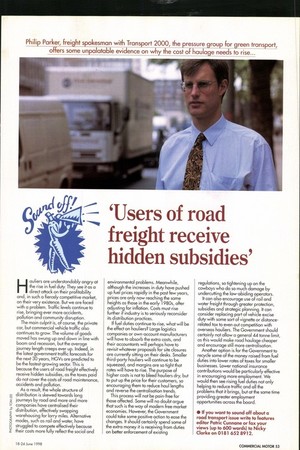'Users of road freight receive hidden subsidies' Philip Parker, freight
Page 59

If you've noticed an error in this article please click here to report it so we can fix it.
spokesman with Transport 2000, the pressure group for green transport, offers some unpalatable evidence on why the cost of haulage needs to rise...
Hauliers are understandably angry at the rise in fuel duty. They see it as a direct attack on their profitability and, in such a fiercely competitive market, on their very existence. But we are faced with a problem. Traffic levels continue to rise, bringing ever more accidents, pollution and community disruption. The main culprit is, of course, the private car, but commercial vehicle traffic also continues to grow. The volume of goods moved has swung up and down in line with boom and recession, but the average journey length creeps ever up. Indeed, in the latest government traffic forecasts for the next 30 years, HGVs are predicted to be the fastest-growing sector. This is because the users of road freight effectively receive hidden subsidies, as the taxes paid do not cover the costs of road maintenance, accidents and pollution. As a result, the whole structure of distribution is skewed towards long journeys by road and more and more companies have centralised their distribution, effectively swapping warehousing for lorry miles. Alternative modes, such as rail and water, have struggled to compete effectively because their costs more fully reflect the social and environmental problems. Meanwhile, although the increases in duty have pushed up fuel prices rapidly in the past few years, prices are only now reaching the same heights as those in the early 1980s, after adjusting for inflation. Costs must rise further if industry is to seriously reconsider its distribution practices. If fuel duties continue to rise, what will be the effect on hauliers? Large logistics companies or own-account manufacturers will have to absorb the extra costs, and their accountants will perhaps have to revisit whatever proposals for site closures are currently sitting on their desks. Smaller third-party hauliers will continue to be squeezed, and margins are so tight that rates will have to rise. The purpose of higher costs is not to bleed hauliers dry, but to put up the price for their customers, so encouraging them to reduce haul lengths and reverse the centralisation trends.
This process will not be pain-free for those affected. Some will no doubt argue that such is the way of modern free market economies. However, the Government could take some positive action to ease the changes. It should certainly spend some of the extra money it is receiving from duties on better enforcement of existing regulations, so tightening up on the cowboys who do so much damage by undercutting the law-abiding operators. It can also encourage use of rail and water freight through greater protection, subsidies and strategic planning. It can consider replacing part of vehicle excise duty with some sort of vignette or distancerelated tax to even out competition with overseas hauliers. The Government should certainly not allow a general 44 tonne limit, as this would make road haulage cheaper and encourage still more centralisation. Another option is for the Government to recycle some of the money raised from fuel duties into lower rates of taxes for smaller businesses. Lower national insurance contributions would be particularly effective in encouraging more employment. We would then see rising fuel duties not only helping to reduce traffic and all the problems that it brings, but at the same time providing greater employment opportunities across the board.
• If you want to sound off about a road transport issue write to features editor Patric Cunnane or fax your views (up to 600 words) to Nicky Clarke on 0181 652 8912.




















































































































